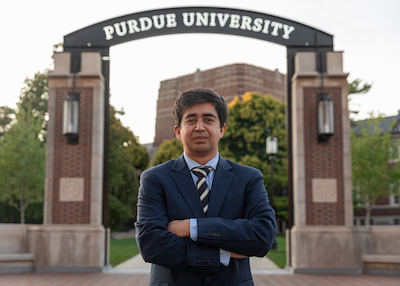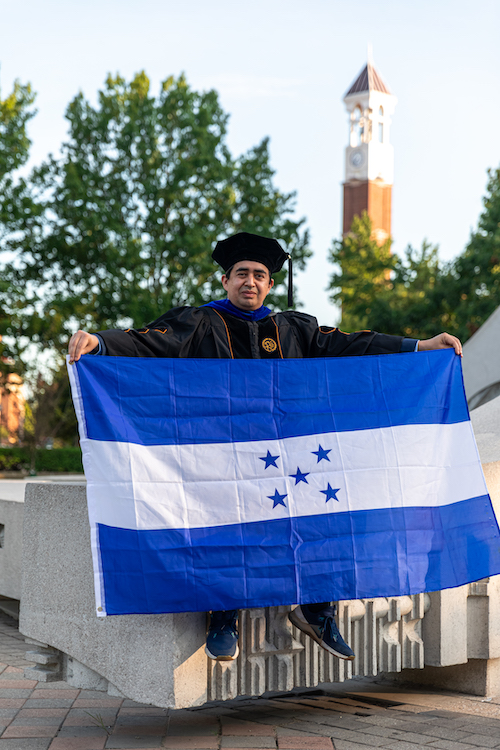Tough challenges built his resilience, Servio Palacios earns his PhD in CS
The Copan Ruinas region of Honduras, most famously known for an archaeological site of the Maya civilization, is a UN World Heritage site renowned for the hieroglyphic staircase, stellae, and museum. Servio Ernesto Palacios Interiano feels immense pride for where he came from. Palacios reminds us, “The Mayans invented the zero independently around 4 AD.” He added, “It’s logical for me, since we invented half of the CS building blocks, to study Computer Science at Purdue University.”

Palacios’ path to Purdue is reflective of what it means to be a Boilermaker. He faced tough challenges and knew it would take a persistent pursuit of innovation to get where he is today. Overcoming obstacles to earn a PhD in Computer Science, that’s Palacios’ giant leap.
A Fulbright scholar and the first person from his region to graduate with a PhD in Computer Science, Servio Palacios has overcome incredible obstacles to be where he is now. The distributed systems researcher made his way through a Bachelor’s Degree in Computer Systems Engineering – without having a computer or the money to buy books.
Palacios taught himself English because his public high school did not offer a second language education. Most people from his high school walked many miles to attend class and lived on less than $100 a month for a family of five.
“I received my Fulbright scholarship because of my background,” said Palacios. “I was the top student in my high school and earned a scholarship to study at UNITEC, a private university. I was entirely out of my league since I didn’t have the financial resources to pay tuition or the expenses related to my education.” He added with pride, “With a significant effort from my parents, I earned my degree and was able to come to Purdue.”
 What is a favorite part of Purdue?
What is a favorite part of Purdue?
My favorite place at Purdue is the Math building wind tunnel in winter.
(Reader: Everyone in College of Science Administration will tell you it’s called a breezeway, though it feels like a wind tunnel.)
Obviously, you’ve had many accomplishments at Purdue, what has been your most impressive?
In Honduras, there are no programs or institutions in CS conducting division I research like we do here. In a university such as Purdue, that background knowledge is taken for granted. The entire concept and process of publications was out of my perspective. Hands-down, what I’m proudest of is earning my PhD in CS, despite my early disadvantage in research and self-taught English.
Can you speak about your area of research in computer science?
My interests include topics in the intersection of systems, distributed systems, information security, graph management systems, and applied cryptography. Similarly, due to my engineering background, I am interested in practical ideas that solve real problems. For instance, my research topic includes auditable computation on (un)encrypted graph-structured data. In my dissertation, I introduced a lineage of research that has proposed moving the computation kernels out of the traditional cloud computation model to provide practical frameworks that compute on (un)encrypted graph-structured data. Similarly, my dissertation provided an analysis of the current solutions for the supply chain that rely on blockchain technologies as a building block; I contributed a practical solution uniquely utilizing current techniques to accomplish auditable, oblivious, and automated certification process in the supply chain. My dissertation includes the invention of two terms: oblivious smart contracts and private automated certifications that are building blocks to automate the certification process in the supply chain. All my projects are open source and required a considerable amount of time.
How does your research impact people’s daily lives?
Many modern applications use graph-structured data as a building block to enhance search, model ontologies, model biological networks, and model social networks (e.g., Facebook, Twitter), to name but a few. Graph-structured data is pervasive and helps to model relationships between entities that are intuitive to understand. Graph-structured data is semi-structured as opposed to the relational model (databases such as Oracle or MS SQL Server); thus, accessing or analyzing network data necessitates new techniques that exploit access locality exhibit by traversal algorithms.
Additionally, current applications that use graph-structured data usually require bulk downloads/upload to/from the cloud or shared nodes—e.g., Amazon AWS, Google Cloud, Microsoft Azure, etc. However, the cloud model poses significant privacy issues. Experience has shown that data stored in the cloud can be compromised, giving the attacker a significantly long window of time to exploit vulnerabilities in key management or the software/hardware stack. Therefore, the cloud model is not suited to highly sensitive graph-structured data applications. My dissertation concentrates on real use cases where data ownership is critical, for instance, in real use cases where the data owner will not upload private graph-structured data to the cloud, even in an encrypted form. Instead, a data owner can provide proof of correct code execution and result derived from her/his private data in a trusted data owner node preserving data ownership.
Similarly, I observed that a multitude of solutions use a "shared database" or blockchain technologies as a building block to provide auditability features. However, I examine the drawbacks of using blockchain technologies in the supply chain.
On behalf of Purdue Computer Science, congratulations Servio! BoilerUP!